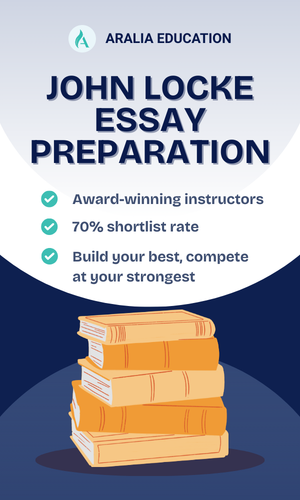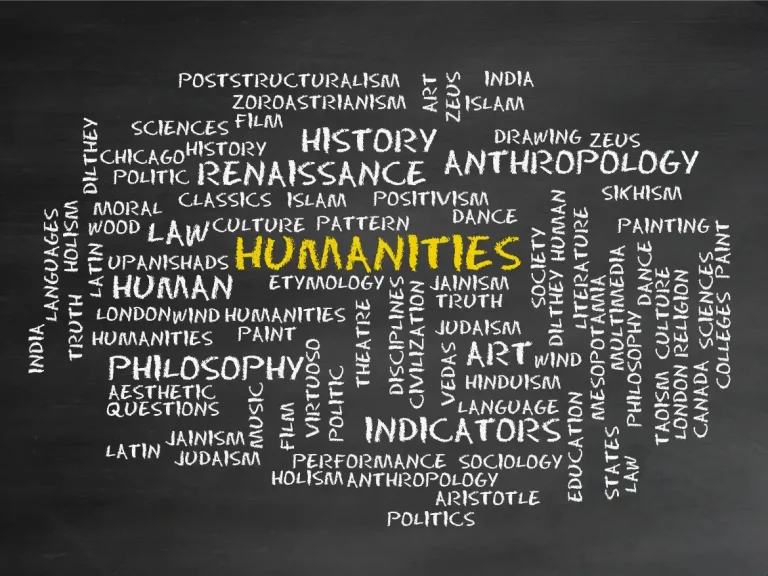What is IB, IB Pathway, and the New IB Pathways?
1. What is IB?
The International Baccalaureate (IB) is a globally recognized program that offers students a challenging curriculum designed to foster critical thinking, international open-mindedness, and lifelong learning. IB is a program for students from ages 3 to 19 that challenges them to excel in both their academic and personal lives. IB has four main educational programs:
- Primary Years: for students from age 3–12
- Middle Years: for students from age 11–16
- Diploma Programs (DP): for students from age 16–19
- Career-related programs (CP): designed for students from age 16–19
The IB Diploma Programme (DP), typically for students aged 16–19, requires students to complete six subject courses along with the IB core: Theory of Knowledge (TOK), Extended Essay (EE), and Creativity, Activity, Service (CAS).
2. IB Pathway
IB Pathway refers to the IB Diploma Programme (DP). The traditional IB DP Pathway requires students to take one course from each of the six subject groups. Students must complete three Higher Level (HL) courses and three Standard Level (SL) courses to earn the IB Diploma.
85% of Aralia Students Place in Top Writing Competitions
3. What are the new IB Pathways?
Recognizing the need for greater flexibility and real-world learning, IB has introduced two new pathways:
- IB DP Personalized/Courses Pathway: Allows students more freedom to combine HL and SL courses across disciplines, tailoring the curriculum to their academic strengths and future goals.
- IB DP Systems Transformation Pathway: Focuses on project-based learning, social practice, and systems-level thinking. This pathway replaces two SL courses with experiential, interdisciplinary projects.
Both of these pathways are currently being piloted and implemented at select Canadian IB schools.
IB DP Personalized/Courses Pathways
The IB DP Personalized/Courses Pathway is designed to give students greater flexibility in shaping their learning journey. Instead of following the traditional model, which requires one course from each of the six subject groups (three at the Higher Level [HL] and three at the Standard Level [SL]), this pathway allows students to select courses more freely.
Students are no longer bound by the fixed 3 HL + 3 SL combination or the requirement to cover all six subject groups. This freedom makes it easier for students to align their studies with their passions, strengths, and postgraduation goals.
The exact requirements can vary depending on the school offering the program. Here are examples from three Canadian IB schools currently implementing the pathway:
- Upper Canada College – DP Course Pathway: Students may choose 4–5 HL courses or adjust their load with more SLs (for example, to balance athletic commitments). They can also select three sciences, whereas the traditional IB allows a maximum of two.
- Branksome Hall – IB DP Select Pathway: Requires English, a second language, and mathematics, but gives flexibility for the other three subjects, which can be chosen from across the six groups.
- The York School – IB DP Personalized Pathway: Combines IB courses with the Ontario Secondary School Diploma (OSSD), offering students more freedom in Grades 11–12.
While this pathway opens the door to deeper specialization and customized learning, students do not graduate with the full IB Diploma. Instead, they earn IB Course Certificates alongside the Ontario Secondary School Diploma (OSSD).
IB DP Systems Transformation Pathways
The IB DP Systems Transformation Pathway is one of IB’s most forward-looking reforms, developed to prepare students for the rapidly evolving world of work. This pathway emphasizes interdisciplinary, project-based learning and social impact, offering students opportunities to engage with real-world challenges and practical applications in meaningful ways.
Out of four IB schools worldwide selected to pilot this program, two are in Canada: Upper Canada College (UCC) and Mulgrave School.
1. IB DP Systems Transformation: Innovation for a Better World - Upper Canada College (UCC)
Upper Canada College is among the first schools globally to launch the Systems Transformation: Innovation for a Better World course in partnership with the IB. This unique offering signals a shift in IB Diploma Programme design toward flexibility, authentic learning, and greater student agency.
At the heart of this pathway is a two-year, project-based course that challenges students to explore complex global issues—social, environmental, and economic—and to design innovative solutions. Students are encouraged to build, test, and refine prototypes, gaining technical skills and confidence.
Key Features of the Curriculum
- Core Curriculum (90 hours): Introduces students to systems thinking, design thinking, and digital innovation tools.
- Curriculum Contexts (200 hours): Focuses on three interconnected areas where students investigate real-world challenges and develop solutions through project-based learning.
- Reflection (10 hours): Provides dedicated time for collective sensemaking, personal growth, and envisioning how students can contribute to meaningful change beyond school.
Pathway Structure
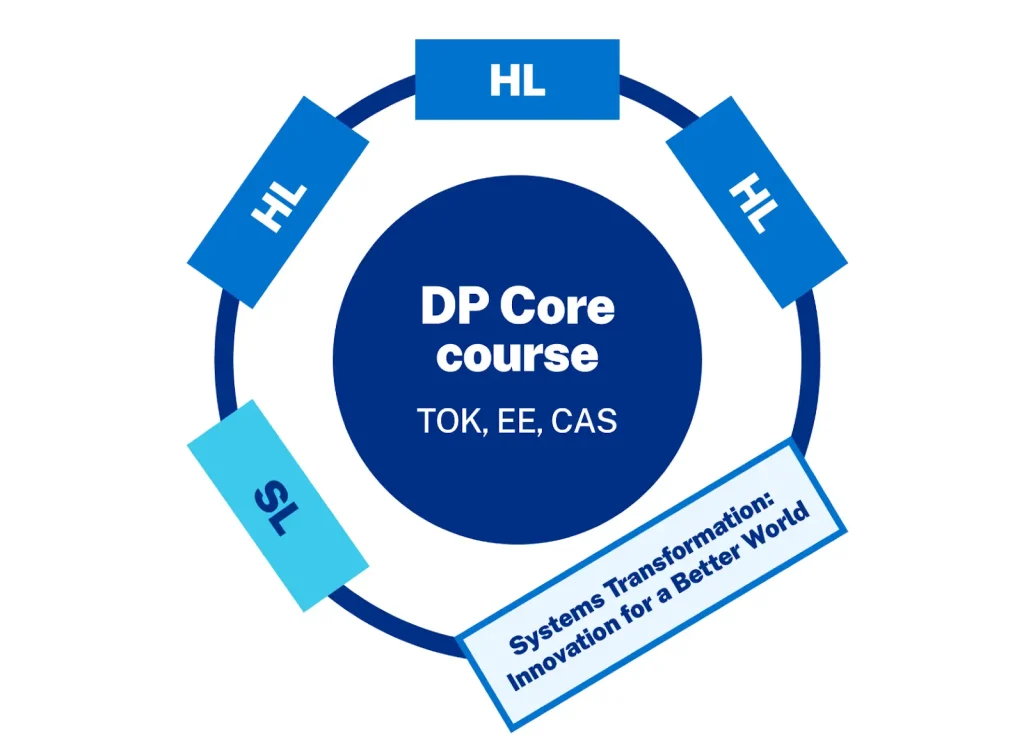
Source: Screenshot from UCC’s website
This pathway has been applied at UCC since fall of 2024. Students in this pathway will complete:
UCC’s DP Core: Theory of Knowledge (TOK), Extended Essay (EE), and Creativity, Activity, Service (CAS).
Systems Transformation: Innovation for a Better World: replacing two SL courses
One additional SL course plus three HL courses with increased subject selection flexibility:
- 1–2 courses in Language and Literature and Language Acquisition
- At least one course in Sciences and Mathematics
- 1-2 courses from any single subject group
Graduation Outcome
Students completing this pathway will graduate with both the IB Diploma and the Ontario Secondary School Diploma (OSSD).
2. IB DP Systems Transformation: Leadership for just and sustainable futures - Mulgrave School
Mulgrave School, The International School of Vancouver, is one of four schools worldwide chosen by the International Baccalaureate Organization (IBO) to co-develop and pilot the IB Systems Transformation: Leadership for Just and Sustainable Futures course. Launched in August 2025, this innovative program is part of IB’s multi-year review of the Diploma Programme and is expected to expand globally by 2030.
The course recognizes that today’s societal systems require fundamental transformation. Its goal is to equip students with:
- A strong grasp of systems’ complexity.
- An appreciation for indigenous 7th-generation thinking, which emphasizes long-term sustainability.
- The knowledge, perspectives, and competencies to lead systemic change in the future.
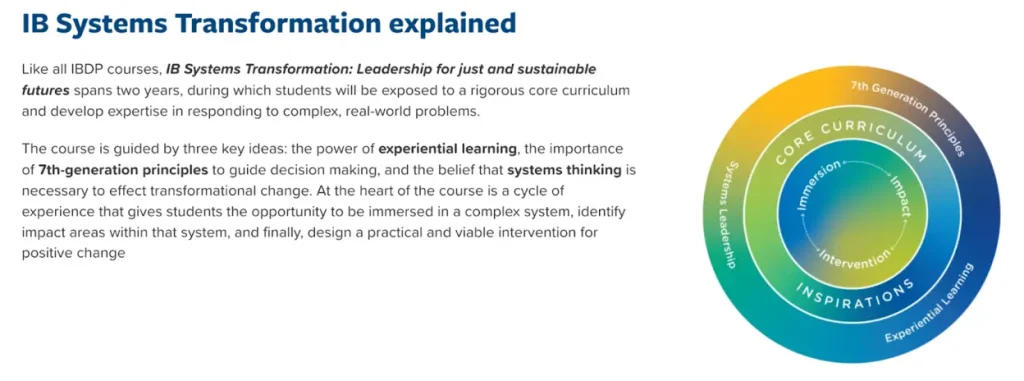
Source: Screenshot from Mulgrave School’s website
Learning is rooted in experiential education, combining extended projects, immersive activities, and collaborations with regional and international partners. Students build resilience and adaptability through an impact portfolio that integrates sample work, self-reflection, teacher feedback, and intervention planning.
Key Features of the Curriculum
Over 100 hours are dedicated to a thorough core curriculum, with areas of study including: Constructing and deconstructing narratives, complex adaptive systems, ethics and ontologies, theories and practices of power, designing for ecopreneurship, and data processing and analysis.
Inspirations (20 hours): Interactions with guest speakers, community partners, and workshops that broaden perspectives and fit into students’ impact portfolios.
Inquiry into Impact Areas (100 hours): Immersive learning experiences focusing on critical global challenges (energy, health, biodiversity, land use, tourism, migration, water, and governance).
Self-Directed and Collaborative Interventions (80 hours): Students, either independently or collaboratively, design and implement systems-level interventions in chosen impact areas, applying theory directly to practice.
Pathway Structure
The pathway structure for the IB Systems Transformation Pathway: Leadership for Just and Sustainable Futures at Mulgrave School will be similar to the System Transformation Pathway at UCC, in which:
- Systems Transformation course will replace two SL courses
- Students will need to take DP Core plus 3 HL and 1 SL courses.
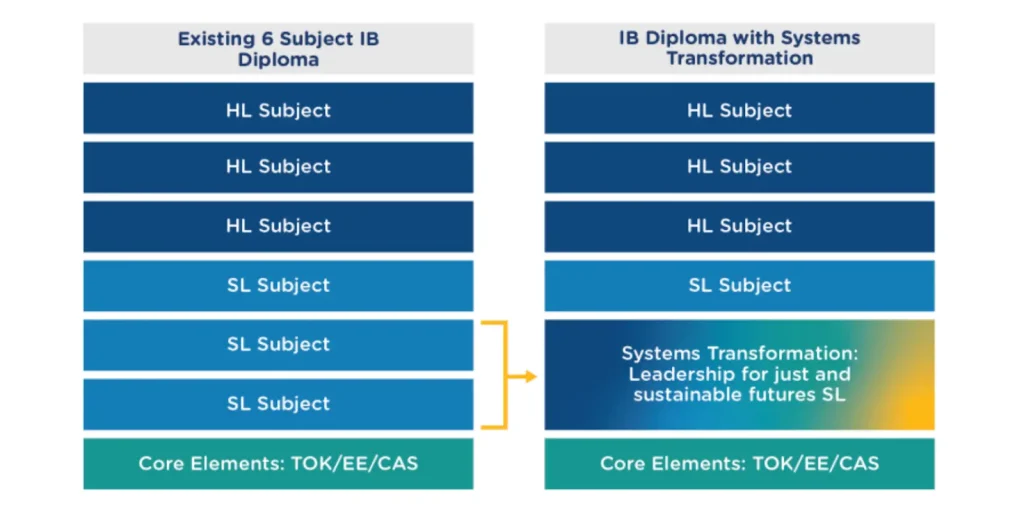
Source: Screenshot from Mulgrave School’s website
Graduation Outcome
The IB Systems Transformation: Leadership for Just and Sustainable Futures course is offered within both the IB Diploma and Mulgrave’s Enriched Pathway, giving students flexibility in how they choose to pursue their academic and personal growth.
Enroll in Aralia’s Comprehensive Courses
3. How is the Systems Transformation Course Assessed?
One of the most significant changes in the Systems Transformation Pathway lies in its approach to assessment. While students are still graded on the IB’s 1–7 scale and work toward the same IB Diploma qualification, they are not evaluated through traditional written exams.
Instead, assessment in this course is project-based, designed to measure applied skills, critical thinking, and real-world problem solving. Students demonstrate their learning through:
- A reflective process portfolio – documenting their growth, insights, and learning journey.
- A case study – applying systems thinking to analyze and address a complex issue.
- Reports and project outputs – showcasing their ability to design, test, and propose innovative interventions.
This shift moves assessment beyond memorization and standardized testing, giving students the chance to prove their competencies through authentic work that mirrors the challenges they will face in universities, workplaces, and society as a whole.
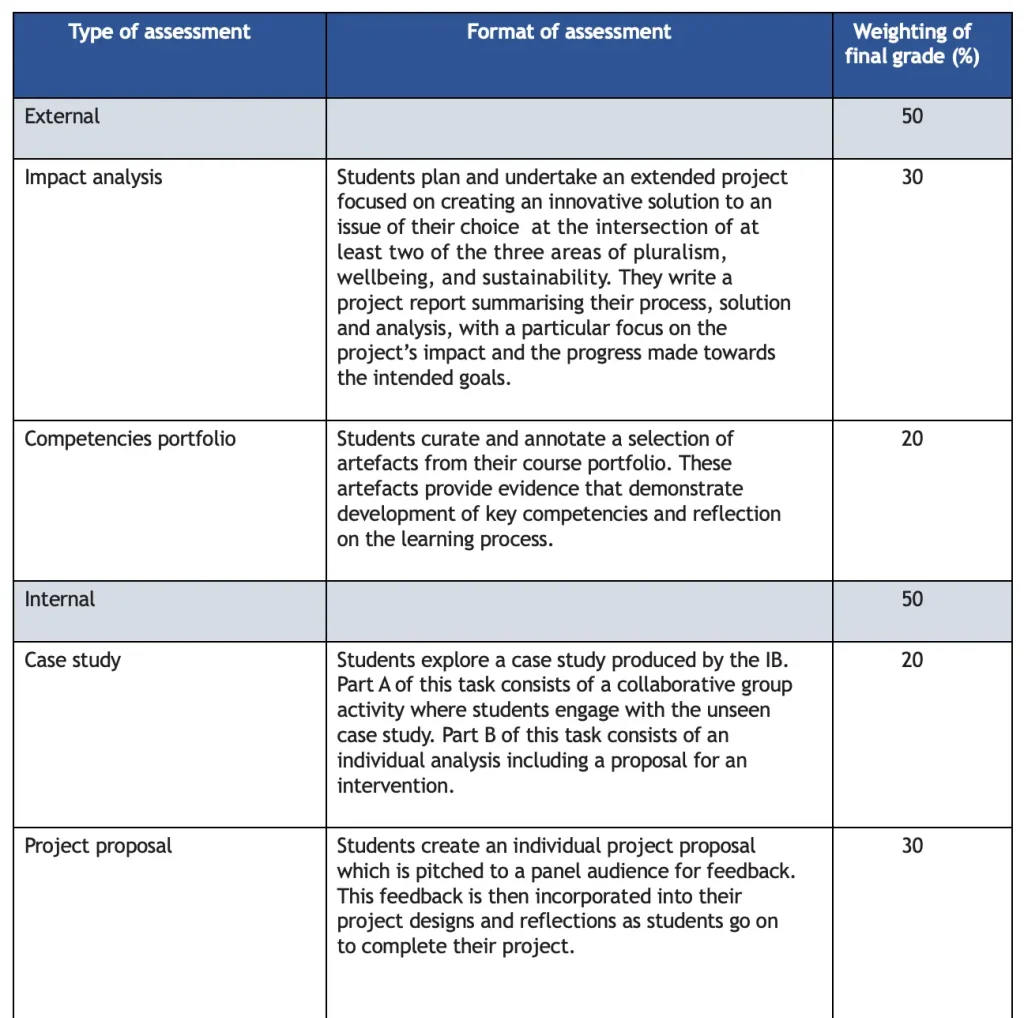
Source: Screenshot of Assessment Model for the Systems Transformation Pathway course at UCC
Compare traditional IB Pathway with the new pathways:
Feature | Traditional IB Diploma Pathway | IB DP Personalized Pathway | IB DP Systems Transformation Pathway |
Core Requirements | TOK, EE, CAS | TOK, EE, CAS | TOK, EE, CAS + Systems Transformation course |
Subject Group Structure | 1 course from each of 6 subject groups | Flexible – can choose multiple courses from same group | 1 additional SL course and three higher level (HL) courses:
|
HL/SL Balance | 3 HL + 3 SL | Flexible HL/SL combinations | 3 HL + 1 SL + Systems Transformation course (replaces 2 SLs) |
Pathway Outcome | IB Diploma | IB Course Certificates | IB Diploma |
While the Personalized Pathway offers more freedom in course selection, the Systems Transformation Pathway integrates real-world challenges into the heart of the IB experience. Depending on personal preferences and desired post-grad outcome, students can consult with parents and academic advisors to decide on the most suitable pathway.
The introduction of these pathways marks a bold step toward making education more flexible, relevant, and impactful. Canadian students at these pilot schools can now join new IB Pathways to prepare for challenges of tomorrow while staying true to the IB’s core mission: nurturing curious, critical, and compassionate learners.

AP Exam Preparation
AP® Exam Preparation Achieve your dream AP® scores Maximize study efficiency and accelerate score improvement with practice examinations, expert strategies and personalized guidance Free Consultation

Getting Started in High School
Getting started in high school Build a strong academic foundation from day one Navigate high school with confidence and set the foundation for success in





